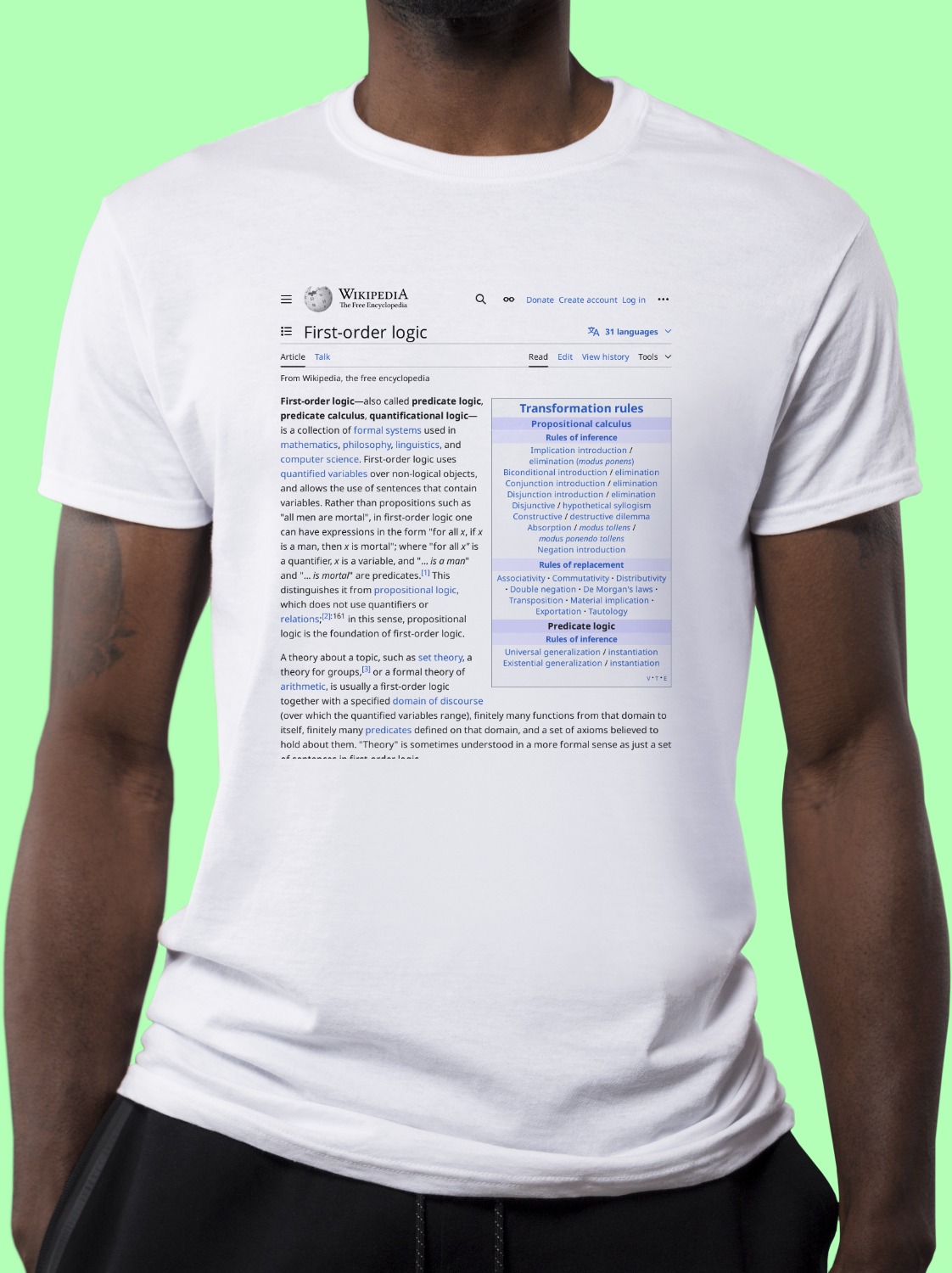
First-order logic Shirt
A classic cotton tee emblazoned with the Wikipedia article on First-order logic ↗.
cotton tee emblazoned with the Wikipedia article on First-order logic ↗.- Preshrunk jersey knit
- Seamless double-needle 2.2 cm collar
- Taped neck and shoulders
- Tear away label
- Double-needle sleeve and bottom hems
- Quarter-turned to eliminate centre crease
First-order logic, also called predicate logic, predicate calculus, or quantificational logic, is a collection of formal systems used in mathematics, philosophy, linguistics, and computer science. First-order logic uses quantified variables over non-logical objects, and allows the use of sentences that contain variables. Rather than propositions such as "all humans are mortal", in first-order logic one can have expressions in the form "for all x, if x is a human, then x is mortal", where "for all x" is a quantifier, x is a variable, and "... is a human" and "... is mortal" are predicates. This distinguishes it from propositional logic, which does not use quantifiers or relations;: 161 in this sense, propositional logic is the foundation of first-order logic.
A theory about a topic, such as set theory, a theory for groups, or a formal theory of arithmetic, is usually a first-order logic together with a specified domain of discourse (over which the quantified variables range), finitely many functions from that domain to itself, finitely many predicates defined on that domain, and a set of axioms believed to hold about them. "Theory" is sometimes understood in a more formal sense as just a set of sentences in first-order logic.
The term "first-order" distinguishes first-order logic from higher-order logic, in which there are predicates having predicates or functions as arguments, or in which quantification over predicates, functions, or both, are permitted.: 56 In first-order theories, predicates are often associated with sets. In interpreted higher-order theories, predicates may be interpreted as sets of sets.
There are many deductive systems for first-order logic which are both sound, i.e. all provable statements are true in all models; and complete, i.e. all statements which are true in all models are provable. Although the logical consequence relation is only semidecidable, much progress has been made in automated theorem proving in first-order logic. First-order logic also satisfies several metalogical theorems that make it amenable to analysis in proof theory, such as the Löwenheim–Skolem theorem and the compactness theorem.
First-order logic is the standard for the formalization of mathematics into axioms, and is studied in the foundations of mathematics. Peano arithmetic and Zermelo–Fraenkel set theory are axiomatizations of number theory and set theory, respectively, into first-order logic. No first-order theory, however, has the strength to uniquely describe a structure with an infinite domain, such as the natural numbers or the real line. Axiom systems that do fully describe these two structures, i.e. categorical axiom systems, can be obtained in stronger logics such as second-order logic.
The foundations of first-order logic were developed independently by Gottlob Frege and Charles Sanders Peirce. For a history of first-order logic and how it came to dominate formal logic, see José Ferreirós (2001).
About Wikishirt
Wikishirt is a retail experiment that lets you buy a shirt with any Wikipedia Article printed on it. There are over 5 million Wikipedia articles, so we have over 5 million shirts.Check out our homepage for random featured shirts and more!